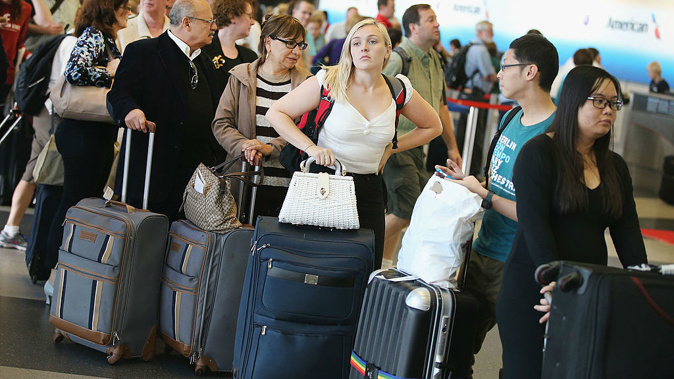
Labour is aiming to cut net migration by 20,000-30,000 a year through an immigration overhaul targeting low-skilled workers and students it considers are exploiting a "back door to Godzone".
Labour leader Andrew Little will set out the long-awaited policy today after criticising the National Government for record high net migration which has seen more than 70,000 people a year settle in New Zealand than are leaving each year.
Little has previously said he wanted net migration restored back to previous levels of about 25,000 a year and pledged a policy to cut numbers of tens of thousands, but refused to say how many.
The Herald understands the policy set out today will target cuts of 20,000 - 30,0000 a year.
The main target of Labour's policy will be those in low-skilled positions which Labour believes could be done by New Zealanders who were not in work and migrants trying to settle in Auckland rather than the regions.
However, Labour will also introduce a special new "KiwiBuild Visa" for construction workers to ensure it can carry out its Kiwibuild policy to build 100,000 houses over 10 years - half of which are intended for Auckland.
That will allow construction companies working in the residential sector to take on overseas workers without the usual labour market test if they undertake to pay the worker the living wage (currently about $20 an hour) and to take on a New Zealand apprentice for each overseas worker they hire.
Only 1,000-1,5000 visas will be given at any one time and the visas will be for three-year periods.
About 7000 visas a year are currently issued or reissued to construction workers.
Labour is also targeting students in "low-value" education courses below degree level - such as food, hospitality and business courses at private training establishments. Labour believes the proportion of those on such courses who go on to seek residency and recent cases of fraud in the international education sector shows such courses are simply seen as an easy way to get into New Zealand and stay.
Labour will outline a new export education policy to focus on higher courses, such as Bachelor degrees and above, arguing that that brings in more revenue than the low-value courses, so the cuts will not mean a significant financial hit for most institutions.
Labour will be careful not to target migrants from a particular region in its changes, but in the student sector it is concerned about Indian students at private training establishments and cases of fraud in the system.
Labour has obtained documents showing immigration officials warned last year about an "exploitative triangle" by agents in the international education sector who were putting quantity ahead of quality, in particular with students from India. It reported most of those students came with the intention of settling in New Zealand and many reported running into hard times.
Little said New Zealand had always been dependent on immigration, but it had to be better managed given the stress it was placing on Auckland in particular.
He said Labour was not targeting migrants from any particular region. "I am focused on the numbers end of it. That is all that matters at a time when the country is as constrained as we are and the challenges we have in terms of accommodating the population we've got. That's the only area we need to have a good debate about. It is not about where people come from."
He was confident that could be done while still meeting the genuine skills shortages.
Labour is also expected to set out new policy for migrants to settle in the regions rather than Auckland and to stay there, including giving regional organisations and businesses more say over what skilled workers they need.
Little has criticised the current system, saying migrants who agree to live in the regions for a period of time to get more 'points' under New Zealand's points system move back to Auckland as soon as that time is up.
National has defended high migration levels and says one of the main drivers is the number of returning New Zealanders and the drop in New Zealanders leaving.
However, it too has started to try to squeeze back numbers.
Last October Immigration Minister Michael Woodhouse increased the number of points skilled migrants needed to get residency from 140 to 160 and cut back numbers allowed under the family category.
Earlier this year, further changes including restricting low-skilled workers to maximum 3-year visas and restricting skilled worker visas to those earning more than $49,000 a year - a change that was expected to hit workers in the hospitality sector.
The Budget also contained plans to increase the stand down period before new migrants could claim a benefit from two years to three years.
Take your Radio, Podcasts and Music with you









